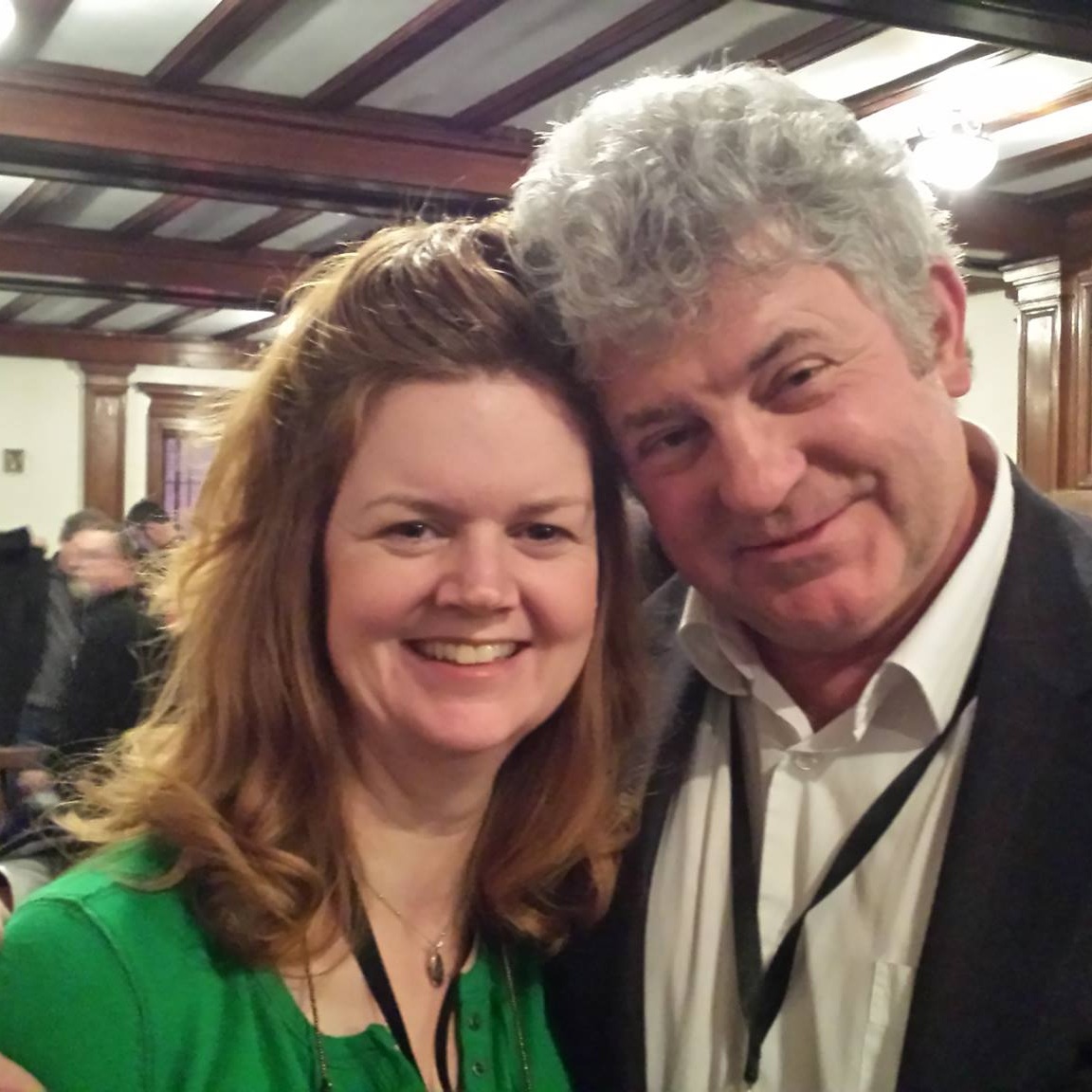Q&A August continues! I first met Kate Powers at the opening reception of the 2016 Shakespeare Theatre Association conference. It was my very first STA conference and I was, needless to say, SUPER NERVOUS about suddenly being in a huge room with hundreds of top-notch Shakespeare experts, artists, administrators, and educators. I felt very much like an impostor and interloper: after all, I was just drawing these stupid little comics, while these people were making Shakespeare come to life, and were changing lives in the process.
I had heard of Kate’s phenomenal work with Rehabilitation Through the Arts at Sing Sing Correctional Facility, so I was already suitably intimidated when I was first introduced to her. However, she took one look at my name tag, said “Oh my god, you’re HER”, and then seized me by the arm and proceeded to lead me around the reception, introducing me to all manner of Shakespearean theatre luminaries and instantly incorporating me into the STA community. And that’s pretty much Kate in a nutshell for you: welcoming and supportive, absurdly generous with her time and energy, and never hesitating to help lift people up in any way she can. Over the past several years she has become a wonderful resource, correspondent, and friend, and I’m so excited to share her with you now.
Take it away, Kate!
1. Who are you? Why Shakespeare?
I am a director, a text nerd, a prison theatre maker. I saw my first production of Shakespeare before anyone had a chance to tell me that this was going to be good for me, or that these people talk funny. I was eight. The play was in a park downtown; we had a picnic and a can of mosquito spray standing by as we watched Petruchio arrive (on a motorcycle, wearing leopard-print hot pants, as it happened) to wed Katharine. I am sure that I missed a lot, but I had a great time.
After a student matinee of my production of Measure for Measure at the Kansas City Rep in 2005, a girl asked at the post-show discussion, with great urgency, if Isabel was going to marry the Duke. When I directed The Winter’s Tale at American Shakespeare Center, I spoke to a lady in the audience who was seeing her first-ever Shakespeare play. She asked me if I had updated the language or if someone else had done it for me. She was stunned when I told her that we had not changed a word. “It’s crystal clear,” she exclaimed. I am all about smashing up the cultural church of Shakespeare and starting the Shakespeare block party.
2. What moment(s) in Shakespeare always make you laugh?
It’s cheap, but it is textually supported cheap. I laugh every time an actor playing Malvolio reads the letter, “If this fall into thy hand, revolve,” takes a beat, contemplates, and then turns in a circle. It’s not actually what the letter writer means (it means “consider,” essentially), but it doesn’t matter. I think you have written a strip about revolving Malvolios, (Mya interjects: I have!) and I would like someone to start a band called the Revolving Malvolios.
3. What's a favorite Shakespearean performance anecdote?
I would probably have to go with Squirrel Butt Romeo.
Mya interjects: Kate is, of course, referring to the immortal anecdote that led to the creation of this comic:
4. What's one of the more unusual Shakespearean interpretations you've either seen or would like to see?
I saw a Czech language production of Hamlet while I was in grad. school. The host at my B&B in Prague strongly discouraged me from going. I think he thought I would be upset when it wasn’t in English. I told him it was okay, that I was fairly familiar with the story. They cast Claudio much younger than I had previously seen. The late king’s much younger brother. He read like an older brother to Hamlet in some ways, and also, he was HOT. I suddenly understood “The king doth wake tonight and takes his rouse, / Keeps wassail and the swaggering upspring reels,” much more clearly, and I also could see the appeal, the sexy appeal, the temptation, the need to believe, for Gertrude.
The interpretation that I have seen far too often is the leather-clad Hamlet wielding an AK-47. Just. Don’t.
Mya interjects: OK, I have definitely seen leather-clad Hamlets, but Hamlet wielding an AK-47? What is that??
5. What passages from Shakespeare have stayed with you?
“It is required you do awake your faith” and “Let be” are perpetually in the front of my consciousness.
Mya interjects: I totally forgot about “Let be”. Is there a more powerful two-word quote in all of Shakespeare?
Right now I hear Sir Thomas More’s “mountainish inhumanity” speech to the rioting mob loudly and insistently:
“Grant them removed, and grant that this your noise
Hath chid down all the majesty of England;
Imagine that you see the wretched strangers,
Their babies at their backs and their poor luggage,
Plodding to th’ports and coasts for transportation,
And that you sit as kings in your desires,
Authority quite silent by your brawl,
And you in ruff of your opinions clothed;
What had you got? I’ll tell you. You had taught
How insolence and strong hand should prevail,
How order should be quelled; and by this pattern
Not one of you should live an aged man,
For other ruffians, as their fancies wrought,
With self same hand, self reasons, and self right,
Would shark on you, and men like ravenous fishes
Would feed on one another.”
6. What Shakespeare plays have changed for you?
Which ones haven’t?
Mya interjects: Touché…
7. What Shakespearean character or characters do you identify the most with?
I pretty much am Beatrice, with a dash of Paulina. Very smart, very punny, often wielding my words as a weapon, tenacious, determined, protective of those around me, and also afraid of getting hurt, yet determined to speak, to name injustice when I see it. “I care not. It is an heretic that makes the fire.”
Mya interjects: The world needs more Paulinas, and the world needs more Kates.
8. Where can we find out more about you? Are there any projects/events you would like us to check out?
I am the founder of the Redeeming Time Project. Our name comes from Hal’s speech in I Henry IV, “I’ll so offend to make offense a skill / Redeeming time when men think least I will.” We make theatre with men incarcerated in two Minnesota state prisons. I started doing this work over a decade ago with Rehabilitation Through the Arts in New York state. We believe human beings are born inherently good, and we teach critical life skills (such as empathy, critical thinking, communication skills, teamwork, conflict resolution, goal setting, delayed gratification) through making theatre together. At Sing Sing Correctional Facility in 2016, while we were rehearsing Twelfth Night, one of the men said, “Shakespeare gave me words for emotions I didn’t know I had.”
The act of imagination required to play a character can become the spark of compassion that leads to empathy. One can learn empathy through the effort of performing a play, because one must ask, “What is it like to be this character? What is it like to walk in his shoes?” Through rehearsal room disagreements about the interpretation of a scene, or a line, one can learn to tolerate not just different points of view but also ambiguity itself. This newly acquired tolerance and wider understanding of human behavior helps cultivate patience and perspective.
Shakespeare teaches us what it means to be human, in all the nobility as well as all the depravity that it can entail. Again and again, he asks us, “What does it mean to be alive? How should we act? Who am I? What do I love?” Redeeming Time makes Shakespeare accessible to all, restores a voice to the silenced and voiceless, and explores the full complexity of the human condition.
Incarcerated individuals who study and perform Shakespeare challenge. They develop a passion for learning. They explore the full complexity of humanity through Shakespeare, reassessing their past and current choices, as well as their future options, as they do so. Although RTP will work with material written by other playwrights and authors, Shakespeare will always be the firm ground on which we stand.
Annoyingly, I couldn’t find a photo of me and Kate (we’ll have to remedy that ASAP, Kate), so here’s a photo of her with an upcoming Q&A August guest. Who is this international man of mystery? TUNE IN NEXT WEEK TO FIND OUT!
(Back to Mya) Thanks so much to Kate for taking the time to answer my questions! You can find out more about Kate and her excellent work here:
Plus, you can hear Kate on several episodes of the Reduced Shakespeare Company Podcast:
Episode 532: Shakespeare and Trump (also featuring yours truly)
COMING THURSDAY: A fellow Michigander who just happens to be one of my personal Shakespearean superheroes!




